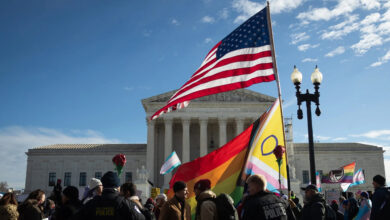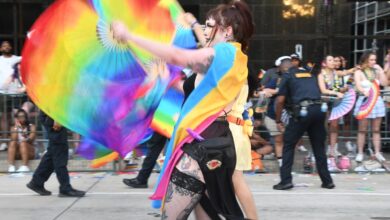
LGBTQ Asian-American Groups Fight ‘Show-Me-Your-Papers’ Law in Texas
By Glenn Magpantay
For shame!
On March 12, the 5th U.S. Court of Appeals issued a decision upholding Texas’s anti-immigrant/anti-sanctuary city law (Senate Bill 4), which is one of the harshest anti-immigrant state laws passed since President Donald Trump took office.
Several Texas cities, including Dallas, Houston, Austin, and San Antonio, filed a lawsuit, in City of El Cenizo v. Texas, to block implementation of SB 4. The National Queer Asian Pacific Islander Alliance (NQAPIA), along with LGBTQ Asian groups and allies in Texas, submitted an amicus (“friend of the court”) brief to illustrate the severe impacts the law would have on LGBTQ Texans, Asian-Americans, and immigrants.
In its decision to uphold SB 4, the court unanimously affirmed nearly all of the provisions of the law.
In our brief, we argued that SB 4 would promote racial profiling of immigrants—and that it would subject Asian-Americans, LGBTQ people, black immigrants, and Latinos to illegal profiling about their immigration status by local law enforcement. We are outraged by this decision.
The brief was signed by Texans Speak Out: KhushATX, a South Asian LGBT group in Austin; OCA Greater Houston Chapter, a non-LGBTQ Asian American/ Pacific Islander ally; the Collective of Houston Asian Americans (CHAA); and Dragonflies of Dallas.
Asian Americans are the fastest-growing immigrant group in Texas, increasing at twice the rate of the Hispanic population. Large metro areas like Dallas and Houston are experiencing particularly rapid growth of Asian-American communities, each with a significant number of undocumented Asian-American immigrants.
Asian-Americans, both documented and undocumented, are also the largest group of immigrants coming to the U.S. Undocumented LGBTQ immigrants are disproportionately Asian. SB 4 would subject Latinx, Asian Americans, Muslims, and LGBTQ people—who are already ethnic, racial, religious, gender and/or sexual minorities—to even further harassment through discriminatory stops and unlimited questioning by police, regardless of actual immigration status.
A disproportionate number of the LGBTQ undocumented immigrant community is Asian-American or South Asian. The impact of SB 4 is compounded for those who are also LGBTQ. This law will subject LGBTQ immigrants to increased harassment and detention.
Studies show that federal immigration authorities already use their discretion to routinely target and detain LGBTQ individuals. Moreover, many LGBTQ immigrants come from countries that criminalize homosexuality. SB 4 increases the likelihood that they could be forced to return to countries where they would face unfair criminal persecution.
We’ve seen this before: The parallels between today’s immigration struggles and the history of Asian people in America run deep. Asian Americans have long endured unjust profiling by law enforcement.
The Chinese Exclusion Act of 1882, made permanent in 1902, was the first law ever enacted to permanently exclude a specific ethnic group from immigrating to the United States. It also excluded Chinese immigrants from applying for U.S. citizenship and essentially legalized racial discrimination. The Japanese-American internment during World War II stemmed more from racism and prejudice than from an analysis of security threats. The traumatic experiences and memories of internment continue to shape the fabric of Japanese and Asian-American consciousness today. Texas was home to three of those internment camps.
Our South Asian community members have faced intensified scrutiny and profiling since 9/11 and increasingly since the election of Trump. These encounters, interrogations and attacks are often motivated by blanket perceptions of all South Asian people as dangerous Muslims. Every day, profiling occurs at airports, on public streets, in gated communities, on the subway.
As Asian Americans, we take a stand against SB 4, because our collective histories tell us we must! The court’s decision is being appealed, and local and national organizations signed on to our amicus brief will be actively involved in that suit.
We will fight this all the way to the U.S. Supreme Court. Every Texan, every American, who believes in fairness and compassion should support this effort.
Glenn Magpantay is the executive director of the National Queer Asian Pacific Islander Alliance (NQAPIA), a nationwide federation of LGBTQ Asian-American, South Asian, Southeast Asian, and Pacific Islander (API) organizations. NQAPIA seeks to build the organizational capacity of local LGBTQ API groups, develop leadership, and expand collaborations to better challenges anti-LGBTQ bias and racism.










